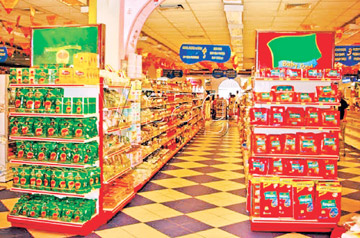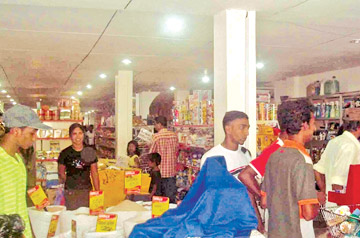|

Food safety, the prime concern:
Check expiry dates, cautions Health Ministry
By Ranil WIJAYAPALA
 The glamorous and glittering supermarkets mushrooming all over the
country has become an appetizer for many who are frantically going
behind attractive food items for their daily consumption. The glamorous and glittering supermarkets mushrooming all over the
country has become an appetizer for many who are frantically going
behind attractive food items for their daily consumption.
But the question is whether we are selecting food items which are
safe for human consumption, as ordinary people are not aware about the
chemicals and the ingredients of the food items they buy from the market
whether it is imported or not.
To find what kind of mechanism is available in Sri Lanka to ensure
that the food items available in the market are safe for human
consumption the Sunday Observer interviewed Director Environmental
Health, Occupational Health and Food Safety of the Ministry of Health
Dr. Ananda Jayalal.
Following are excerpts of the interview;
Q: Food safety is one of the key concerns in the developed
world due to various factors. What are the key mechanisms Sri Lanka is
having at present to ensure that the food items available in Sri Lanka
markets are safe for human consumption ?
A: Food safety is a very important issue for everybody,
because fatal diseases can be contacted and there can be very unpleasant
situation like diarrhoea and the long consumption of such food can
generate cancerous material inside human body. So food safety is a very
important issue.
|

Dr. Ananda Jayalal |
The Food Act of No. 26 of 1980 is the main legislature controlling
the food safety in Sri Lanka. Under the Food Act the Minister of Health
can issue food safety regulations from time to time in consultation with
the Food Advisory Committee. At present there are standing regulations
covering almost all the food. These regulations are mainly implemented
by our Public Health Inspectors on the field. According to this system,
Sri Lanka is divided into Medical Officers of Health and they are the
authorised officers under the Food Act.
Under these Medical Officers Public Health Officers are operating. So
they are authorised to enter a market or any other place where food
items are sold and check what is there and take necessary samples and
send them for laboratory analysis. They can prosecute the offenders in
the Magistrates Court. They are authorised to do all these things. Under
the Food Act the production, storing, transportation, exposure of food
items for sale, and distribution everything is covered. Advertisement
and labelling is also covered under this regulation.
Q: There are serious issues relating to the imported food
items. The way they are imported, packaging and the ingredients of these
food items have become big issues. What are the mechanism in place to
ensure that food items which are imported to the country are safe for
human consumption?
A: Under the Food Act, Director General of Customs is the
authorised officer for the importation of food. So we assist the
Director General of Customs by inducting food inspectors in the entry
points such as Colombo harbour and air port. They are being asked to
implement these regulations under the Food Act and they can inspect the
food that is being brought to the country and take samples. For example
milk powder, they take a sample for fat content and for three test and
for radio active. So they have to send samples for the Government
Analyst and to the Atomic Energy Authority. Once when those reports are
cleared the consignment are released to the market. Every food is
monitored like this.
Q: There are issues relating to the importation of food items
in bulk form and packeted here in Sri Lanka. There is no guarantee
whether they are bringing expired food items or not?
A: This is a very difficult situation to monitor. They import
things like milk powder in bulk form and packed them here. Sometimes
milk powder is produced in some other country brought to another country
and packeted them and released to the market. Sometime these things are
very difficult to monitor. But the manufacturer or the distributor of
these food items are responsible for the quality of the food.
They are responsible when something happens before the expiry date
they mention in the pack.
They should guarantee that the food is safe until such date they have
expressed. They have the freedom to express the date of expiry and that
is their responsibility. If we found that the food item is not suitable
for human consumption before that date they can be penalised. There are
instances where two of three things are mixed together and packed and
released to the market. Then there are difficulties to check whether
they are fit for consumption. Even then the manufacturers, distributor
or the packer is responsible for the quality of the food released to the
market. They should guarantee that until such date they have mentioned
the food is safe for consumption.
 Q: There are so many food additives used in the food items
available in the market. In Europe there are E- numbers to mention the
food additives included in the food item. What are regulations available
in Sri Lanka to educate the public about food additives? Q: There are so many food additives used in the food items
available in the market. In Europe there are E- numbers to mention the
food additives included in the food item. What are regulations available
in Sri Lanka to educate the public about food additives?
A: There are regulations with regard to food additives. Our
standard are also on par with European standards. Most of the additives
which are not allowed are not allowed in Sri Lanka also. There are
chemicals that can be used for certain kinds of foods that cannot be
used for other foods. There are restrictions also. We have clear
regulations to say that these things can be added and things that cannot
be added.
The labelling
The regulations say that the additives should be indicated on the
label. Only thing is many are technical names and people are not aware
of such things. Anyway our Public Health Inspectors and the Food
Inspectors are aware.
In our programmes also we make them aware of these things.
That is why one PHI inspected some food items and filed action
against the manufacturer of a popular brand of margarines.
Q: There were issues relating to the substandard storage of
food items which have been contaminated and become poisonous to people.
How are you monitoring those things?
A: There may be chemicals in the containers and packaging
materials which can be entered into the food. That possibility is there.
That is a issue discussed at the international level as to whether these
packaging materials are safe or not. There is a possibility of some
packaging materials entering the food or water. But usually that cannot
cause sudden illness or sudden death but it can be carcinogenic.
Q: There are some food additives such as E- 621 MSG Mono
Sodium Glutamate which are banned in certain countries but imported to
Sri Lanka in popular brand names. What action can you take with regard
to banning such harmful food additives? Is there any process to do so?
A: But I don't think it is banned abroad. There are
international standards. For food there is an international organisation
called Food and Agriculture Organisation, World Health Organisation
joint Food Standard Programme.
It is called Codex. They meet yearly and update their standards for
food. Most of the time we follow the international standards. Most of
the time food additives we have allowed are approved internationally.
Mono sodium glutamate for certain concentration they are allowed to use.
Q: The Health Ministry recently introduced regulations with
regard to food packaging. What is the aim of this regulation and what
are the packaging material which are harmful?
A:We cover so many aspects in this regulation. If you take
one, the packaging should be upto international standards. Most of the
time the chemicals and materials used in the package materials are not
food grade matters. Under these regulations even the glue sticker in the
bottled water should be food grade one.
The other thing is the chemicals in the container should not leak
into the food matter. Packages used for any other purpose also cannot be
used for food packaging. Another thing is toys which are stuck in to the
food item as promotional matters. They can put them but the food should
be separated from the pack.
The regulations aims at prohibiting the import, manufacture,
transport, advertise for sale, sell, package, store, use or distribute
food packaging material or article which under normal and foreseeable
conditions, injurious to human health, deteriorate the organometallic
characteristics of food or change the nature substance and quality of
food.
Manufactures should be able to produce a certificate from the raw
material used for the packaging are in conformity with the international
standards.
The packaging material should not contain any substance of antimony,
arsenic, cadmium or any other toxic substances.
These regulations are also aimed at prohibiting the use of any vinyl
chloride plastics in coatings applied to fresh fruits in order to retain
freshness or any bottle, box or other container made of or containing
acrylonitrile plastics as a container.
These regulations also has prohibited the use of any package,
appliance, container or vessel that has been used or intended to be used
for any non-food product to or keep sugar or flour in any sack that has
previously been used for any other purpose, use of any edible fat or any
edible oil in any bottle or metal container that has previously been
used for any other purpose, use of any plastic container that has
previously been used for any other purpose unless the food has been
packed in any extra wrapper of food grade material.
The use of any bottled drinking water in any container of not less
than 18 litres in size that has previously been used for any other
purpose and packing food in any package appliance, container or vessel
that has been made from recycle plastic.
Q: Has the Health Ministry taken any follow-up action with
regard to Court Order given against the manufacturer of a popular brand
of margarine?
A: The case regarding this issue is not over yet. The Court
has given an interim injunction. Court has given an order that the
manufacturers should mention that the product is not suitable for
children under three years.
At the moment there are a lot of agitation going on with the Attorney
General and the Ministry of Health to implement that. The other thing is
that they have been prosecuted under the Penal Code but not according to
the Food Act.
In the penal code also there is a provision to take action against
any food manufacturer if there is something harmful to the human life is
found in food items.
Some Public Health Inspectors also use that provision to prosecute
the offenders. Sometimes they use both the penal code and also the Food
Act.
In addition to Food Act there are laws available under Consumer
Affairs Authority by laws of the Municipal Councils and Pradeshiya
Sabas. Some PHIs are making use of them also to prosecute the offenders.
Q: The Health Ministry is going to impose restrictions on
importing food items which are closer to the expiry date. How are you
going to implement that?
A: This is a very recent regulation we imposed under the Food
Act and it will come into effect from August 1, 2011. From that
regulation we intend to restrict the importation of food items which has
less than 60 per cent of its lifespan when it is imported to the
country. Sometimes they import very late and they will expire soon after
being released to the market.
With the introduction of this regulation there is substantial time
available for the consumers to consume it.
Q: Health Ministry is imposing many regulations with regard to
the food safety. The complaint is that there is not enough strength to
monitor whether these regulations are properly implemented?
A: We are progressing very well. There are enough Public
Health Inspectors. We have around 1600 PHIs. One thing is that they have
to attend to so many other activities such as dengue control activities.
When their areas are affected with communicable diseases, naturally
they will focus their attention at controlling that. Therefore food
control activities will suffer. But lot of things are happening with
regard to the food safety which the public are not aware of.
If you go to a supermarket and ask they fear PHIs. Sometimes PHIs are
having their regular visits to these supermarkets and taking regular
sampling. But I agree that a lot more has to be done.
We will gradually make the public aware of the food safety measures.
Now we are giving a lot of publicity for these activities. Sometimes
government officials are not aware of these things. We are hoping to
make people aware of these things. |

